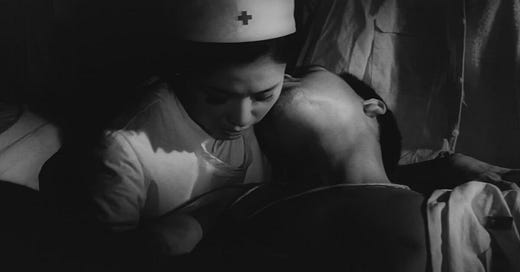For the last few months, I’ve started each of these posts with an apology. We are I don’t know how many weeks into the writers strike, and for whatever reason my brain has determined that writing these little posts should not be part of my routine. It’s unfortunate because what I crave more than anything now is structure and self-reassurance. I love movies and TV, and I want to be in that world forever.
I should write more fucking posts.
—
Despite living in a state of perpetual anxiety, I watched a hellish movie the other night, a Japanese anti-war film called Red Angel (1966). It’s simplicity stuck out to me, particularly it’s unfussy depiction of on the front medical units. Red Angel takes place during the Second Sino Japanese War, and follows a young nurse, Sakura Nishi, who has trouble performing her most essential task: turning off her humanity and dedicating herself unsentimentally to the men — dying, disabled, and depressed — who appear in front of her.
The Japanese Army is flailing, and the doctor’s are unable to do little more than amputate to save the lives of the soldiers who show up. There’s not enough blood for transfusions and not enough energy to boost the morale of the men who pass through.
Through a series of trials and tribulations, Nishi ends up falling for a morphine-addicted surgeon, who has resorted to taking drugs to numb out his reality: here, he is not a doctor, but an arbiter of life and death — an identity he resists. So he invites Nishi to his room every night, and over French wine they have discussions about his cynicism, about how best to treat their patients, and together they find an unconventional intimacy that culminates in Nishi helping the doctor shoot up.
Yasuzo Masumura shoots this without any fuss. His social dramas are always straightforward, and even with something as relentless as the atrocities of war, he understands that what hits most in the world is unsensational realism. So he shoots with an elegance that his movie deserves. The film revolves around the human form, and from its opening moments we see bodies, body parts, lined up as if ready for the assembly line. There are gorgeous shots of Sakura in bed with an armless man, who in his desperate state wants to feel something now that he has been rendered an invalid. The shadows in the doctor’s room, a reprieve from the outside world, are equally stunning, both claustrophobic and comforting to the young nurse oscillating between over compassion and the icy efficiency expected of a soldier.
I think about how often we resort to extremes to emphasize the idea that “a real bad thing happened here,” instead of depicting it for what it actually was: a nightmare that never feels implausible, that’s punishingly consistent even if there are moments of joy and romance. Red Angel shows the senseless death, but more devastatingly it captures the expectation that institutions have for you to turn yourself off for the sake of a cause that inevitably feels out of reach.





They’re doing a 12-film Yasuzo Masumura retrospective at KVIFF this year! I’m on my way there now. I’m hoping to see all 12, including this film. I’m so stoked.